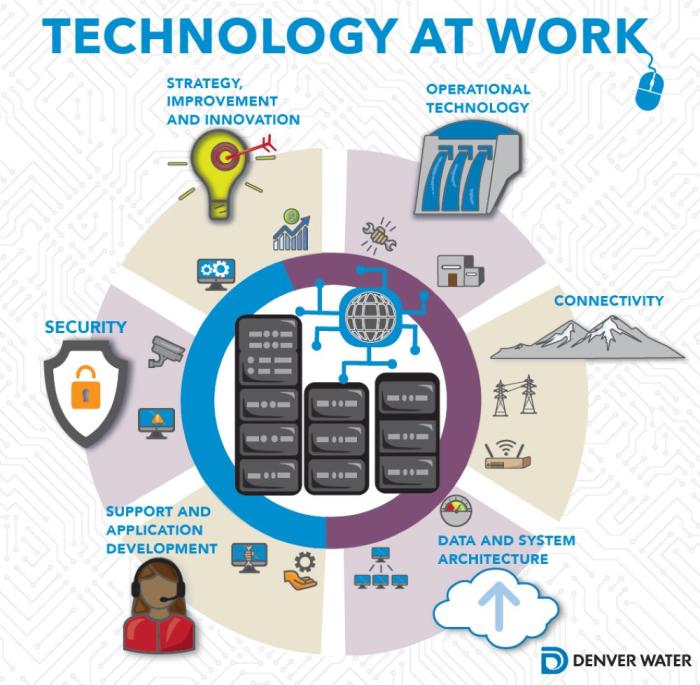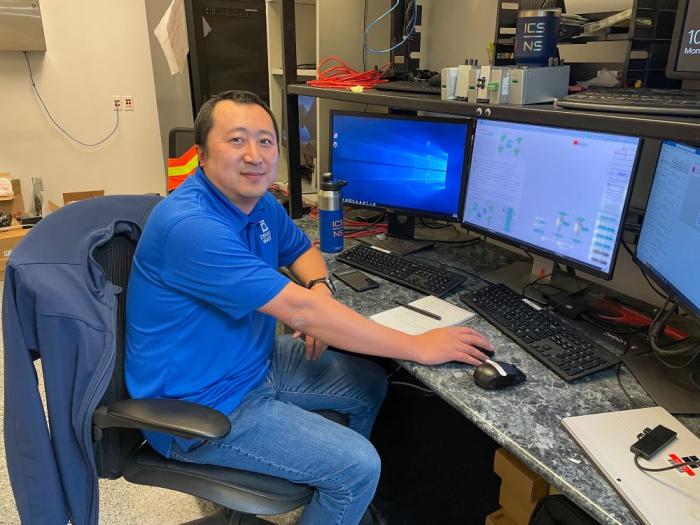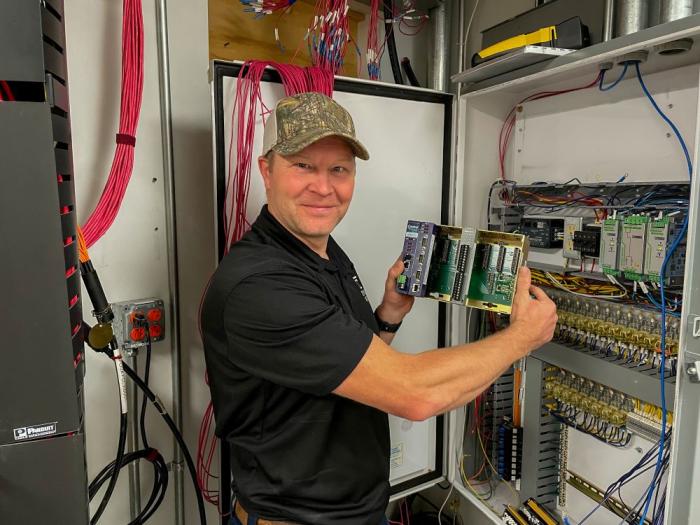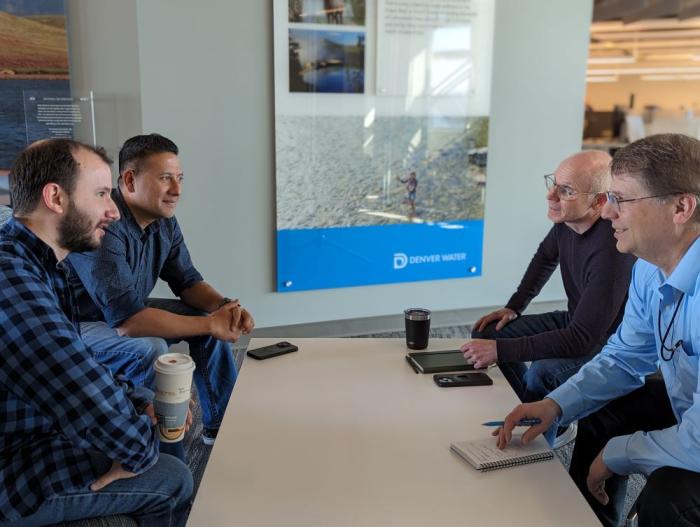Unveiling the technology experts powering a vast infrastructure
From high in the snowcapped mountains to the foothills and the bustling city of Denver, a network of cables, fiber optics, radio and wireless signals connects employees, systems and facilities that run Denver Water’s vast, complex system.
With a water collection system spanning more than 2.5 million acres and a service area that extends 335 square miles, making sure critical technologies function in perfect harmony is no small task. When you think of cutting-edge technology, a water utility may not be the first place that comes to mind.
But technology is critical to ensuring every part of Denver Water’s system functions smoothly to deliver clean, safe water to 1.5 million people — and the utility’s IT experts make that happen.
“The work we do in IT is so important,” said Jonathan Spitze, director of business technology and project management. “There aren’t many places you can work where you can combine your love and passion for technology with such a meaningful and important mission.”
From technical experts who program and maintain the systems that control dams, hydroelectric plants and water treatment processes; to application developers and technical support staff who manage many enterprise applications; to experts who manage the utility’s data centers, data storage and cloud environments; more than 100 IT experts work in every facet of Dever Water to ensure safe, resilient and reliable technology.
Take a closer look at some of the IT roles that help power Denver Water’s complex system:
Data and system architecture
These teams manage the reliability, performance and security of Denver Water’s data centers, data storage and cloud environments. These employees are the innovators and technical neurosurgeons who build and care for the utility’s “brain,” ensuring the organization’s technological health and wellness.
Support and application development
Without support, a system breaks down, and without innovation and development, an organization can become inefficient or unproductive. Several IT teams provide technical support for software and hardware. In addition to troubleshooting technical problems, these employees constantly innovate, develop and perfect enterprise applications, both on-premises and in cloud environments, to help employees — and the system — perform at their best.
Connectivity
The network and wireless teams focus on providing critical redundancy and secure internet connectivity, telephone and radio communications across Denver Water’s many facilities. Every part of the utility’s system relies on these important networks for communications and operations. From mountain reservoirs to treatment plants to the distribution system that sends water to customers, reliable connectivity is crucial to ensuring the entire system is coordinated and running smoothly.
Operational technology
Several teams of technical experts work on industrial controls, a collective term for the different types of systems and instrumentation used to operate or automate industrial processes — like collecting, treating and distributing water. These employees are out and about across Denver Water facilities, where they design, install and maintain the control systems that allow the operation — on-site and remotely — of dams, hydropower plants, treatment plants, pump stations and more. These skilled technicians may also build control panels, conduct preventive maintenance, run calibrations or validate standards for various components like sensors, pumps and meters that are critical to delivering water.
Security
Physical and cyber security are crucial to ensuring the integrity of systems and the utility’s ability to collect, treat and deliver water. These teams of employees identify and analyze risks and monitor all online systems to identify and mitigate potential cyber treats. They also protect the utility’s physical assets and facilities by installing and maintaining door controls and security cameras that are used daily to monitor security at sites across the vast collection system.
Strategy, improvement and innovation
Every team in IT incorporates strategy, continuous improvement and innovation in their work, and they are supported by IT project management and asset management experts who provide guidance and oversight to ensure Denver Water is using and implementing the best, most efficient and cost-effective software and hardware available to meet the organization’s goals. These teams manage technology projects that span across all divisions of Denver Water, as well as oversee the sourcing and licensing of hardware and software.
Working in IT doesn’t necessarily mean you’re always sitting behind a desk.
“Many of our teams have the opportunity to work at Denver Water facilities in locations across the state,” said Mark Thomas, director of IT operational technology. “There aren’t many people who can say their ‘office’ for the day was at the base of Eleven Mile Canyon Dam, working below the spectacular towering canyon walls alongside the pristine South Platte River, or on top of Mount Morrison at a radio tower with sweeping views of the entire Front Range.”
Find a rewarding opportunity at denverwater.org/careers.
These employees have a chance to work on a variety of different systems and technologies that make up Denver Water’s infrastructure, having a direct and tangible impact on the utility’s ability to collect, treat and deliver water.
Not only are employees able to connect their work to an important public service mission, but they also have the opportunity to work on cutting-edge, innovative programs and systems.
And with the pace of technological advances at an all-time high with robotics, artificial intelligence, virtual reality, machine learning, advanced network architecture and more, Denver Water’s IT teams must be nimble.
“We’re not your grandfather’s utility,” said Keith Oligney, director of IT infrastructure. “Denver Water is a forward-thinking organization, and our employees have the opportunity to work on so many diverse projects and with various technologies,” he said.
“Our employees get to be a part of defining where we go from a technology standpoint, allowing them room to grow and learn across disciplines and get valuable cross-training in different facets of IT.”






